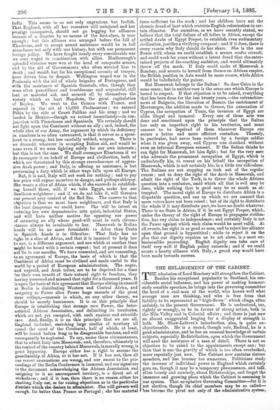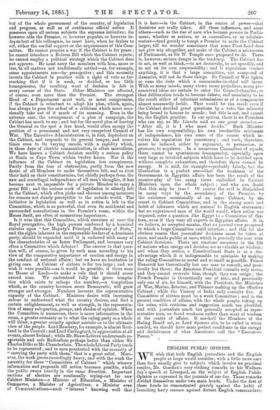THE ENLARGEMENT OF THE CABINET. THE ENLARGEMENT OF THE CABINET.
THE admission of Lord Rosebery will strengthen the Cabinet. Besides his exceptional popularity in Scotland, his considerable social influence, and his power of making humourously sensible speeches, he brings into the governing committee the head of a cool man of the world, who knows well what average men are thinking, and who is free from that liability to be represented as "high-flown " which clings, often unfairly, to the present Government. He is understood, too, rightly or wrongly, to be in favour of strong action, both in the Nile Valley and in Colonial affairs ; and there is just now an almost exaggerated longing for a display of strength in both. Mr. Shaw-Lefevre's introduction, also, is quite unobjectionable. He is a sound, though safe, Radical, he is a good administrator, and he has an unusual knowledge of certain subjects, especially Redistribution, upon which the Government will need the assistance of a man of detail. There is not an objection to be raised to the appointments except one ; but then that is one the gravity of which is too often overlooked, more especially just now. The Cabinet now contains sixteen members, and has become too numerous. Politicians study the increase of individual power in England which certainly goes on, though it may be a temporary phenomenon, and talk, often loosely and unwisely, about Dictatorships, and forget the immense and growing place which the Cabinet is assuming in our system. That co-optative Governing Committee—for it is not elective, though its chief members may be so called— `has become the pivot not only of the administrative system, but of the whole government of the country, of legislation and progress, as well as of continuous official action. It possesses upon all serious subjects the supreme initiative; for however able the Premier, or however popular, or however independent of his colleagues, he must have, when he desires to act, either the cordial support or the acquiescence of this Committee. He cannot propose a war if the Cabinet is for peace ; he cannot introduce a Reform Bill which the Cabinet rejects ; he cannot employ a political strategy which the Cabinet does not approve. He must carry the members with him, more or less,ln all matters not traditionally settled—as, for example, some appointments are—by prerogative ; and this necessity invests the Cabinet in practice with a right of veto so farreaching that if it is weak, or divided, or too little homogeneous, the resulting want of decision is felt in every corner of the State. Other Ministers are affected, of course, even more than the Premier. The strongest Head of a Department must wait, or must compromise, if the Cabinet is reluctant to adopt his plan, which, again, has always to pass the ordeal of a criticism which must occasionally take out of it much of its meaning. Even in the extreme case, the arrangement of a plan of campaign, the Cabinet has much to say ; and but for the novel plan of leaving the General on the spot a free hand, would often occupy the position of a permanent and not very competent Council of War. The Executive Administration is, in fact, dependent on the Cabinet, and responds to its general temper, and sometimes even to its varying moods, with a rapidity which, in these days of electric communication, is often marvellous. We have known a Cabinet decision modify a serious policy at Simla or Cape Town within twelve hours. Nor is the influence of the Cabinet on legislation less conspicuous. Partly from the fear of obstruction, partly from the new desire of all Members to make themselves felt, and so rivet their hold on their constituencies, but chiefly perhaps from the new and centrifugal independence of all men's thoughts, it has become next to impossible for a private Member to carry a great Bill ; and the serious work of legislation is silently left to the Cabinet, which often picks and chooses among measures for reasons not clearly perceptible to the outside world. The initiative in legislation as well as in action is left to the Committee, which is so powerful, that even its accidental and unrecorded consultations in the Premier's room, within the House itself, are often of momentous importance.
Is it wise that this Committee, which exercises at once the Royal prerogative, the high powers conferred by a hundred statutes upon " her Majesty's Principal Secretary of State," and the rights inherent in the responsible leaders of a dominant party, should be expanded until it is endowed with many of the characteristics of an Inner Parliament, and becomes very often a Committee which debates ? The answer to that question will, of course, be given by each man according to his view of the comparative importance of caution and energy in the conduct of national affairs ; but we have no hesitation in giving ours. A Cabinet of sixteen is far too large ; and we wish it were possible—as it would be possible, if there were no House of Lords—to make a rule that it should never exceed nine. We understand fully the grave temptation which exists to enlarge the number,—a temptation which, as the country becomes more Democratic, will grow stronger and stronger. Numbers increase the representative capacity of the Cabinet. Ministers desire with increasing ardour to understand what the country desires, and find a certain enlightenment, as well as strength, in the representation of many sub-parties, groups, and shades of opinion. When the Committee is numerous, there is more information in the room, a greater certainty as to what the ruling party as a whole will think, a greater security against mistake as to the ultimate view of the people. Lord Rosebery, for example, is almost Scotland in the Council ; and Lord Carlingford, in appreciation at all events, almost Ireland ; while Mr. Shaw-Lefevre understands respectable and safe Radicalism perhaps better than either Sir Charles Dilke orMr. Chamberlain. The whole Liberal Party tends to be represented ; and to men penetrated with the necessity of " carrying the party with them," that is a great relief. Moreover, the work grows exceedingly heavy, and with the work the necessity for those " Committees of Cabinet " which winnow information and proposals till action becomes possible, while the public sways heavily in the same direction. Important sections of electors are continually crying-out for new Cabinet Ministers—a Minister of Education, a Minister of Commerce, a Minister of Agriculture, a Minister even of Communications—each " interest " knowing well that it is here—in the Cabinet, in the centre of power—that decisions are really taken. All these influences, and some others—such as the rise of men who become powers in Parliament, whether as orators, or as counsellors, or as administrators—tend greatly to tempt a Premier to make the Cabinet larger, till we wonder sometimes that some First Lord does not give way altogether, and make of the Cabinet a microcosm of Parliament, as Sir W. Temple once proposed to do. There is, however, serious danger in the tendency. The Cabinet has to act, as well as think,—to act decisively, to act speedily, and to act on its own responsibility ; and if experience teaches anything, it is that a large committee, not composed of dummies, will not do these things. No Council of War fights, or runs the risks which a commander-in-chief will incur. With so many minds, many views, many prejudices, many preconceived ideas are certain to enter the Council-chamber, so that deliberation tends to become debate, and unanimity to be the result either of reluctant submissions or of a compromise almost necessarily feeble. That would be the result even if the Cabinet decided great questions by a vote, the minority being bound in honour to accede ; but this is not, and cannot be, the English practice. In our system there is no President who can say, as Mr. Lincoln said on one great occasion,— "After all, it is I who must decide." Each Minister has his own responsibility, his own irreducible minimum of independence, his own sense of the course which involves his reputation for consistency ; and each, therefore, must be induced, either by argument, or persuasion, or pressure, to acquiesce. In a numerous Committee of equals, there cannot be spontaneous homogeneity, especially upon very large or involved subjects which have to be decided upon without complete exhaustion, and therefore there cannot be energy. It is said, for example—probably falsely, but the illustration is a perfect one—that the weakness of the Government in Egyptian affairs has been the result of the counter-play of too many views embodied in Cabinet Ministers upon the whole subject ; and who can doubt that this may be true ? Of course the evil is diminished in many ways by the ascendancy of the Premier, by the existence occasionally of an inner Cabinet, by the resort to Cabinet Committees, and by the strong sense and habit of tolerance which are natural to English statesmen ; but no experienced man of the world would, when action was required, refer a question like Egypt to a Committee of Sixteen, even if they were all experts in Egyptian affairs. It is, we believe, an accepted maxim, that no journal ever prospered in which a large Committee could interfere ; and this for the obvious reason that journalists' decisions must be taken at once, and made public at once, which is precisely the case with Cabinet decisions. There are constant occasions in the life of nations when energy and decision are as valuable as wisdom; and when they arrive, a Constitutional State is at a disadvantage which it is indispensable to minimise by making the ruling Committee as secret and as small as possible. Prince Bismarck has theoretically but one man to consult, and practically but three ; the American President consults only seven, and they cannot overrule him, though they can resign ; the French Premier is theoretically one of nine, and practically only one of six, he himself, with the President, the Ministers of War, Marine, Interior, and Finance making up the effective Cabinet ; while the Viceroy of India only consults five. A Committee of sixteen must be a weak Committee ; and in the present condition of affairs, with the whole people taking up the reins, with criticism and suggestion much too plentiful, and with journalists much too generally accepted as repre sentative men, we dread weakness rather than want of wisdom at the centre of affairs. If one-half the Members of the Ruling Board sat, as Lord Spencer sits, to be called in when needed, we should have more perfect confidence in the energy and decisiveness of what Americans call the "Executive Power."



































 Previous page
Previous page